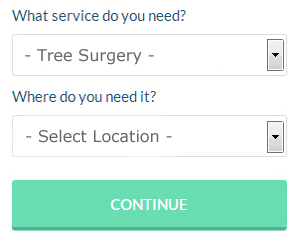Liphook Tree Surgeons (GU30): So, you're keen on your garden and revel in accomplishing the multitude of gardening tasks that arise through the year. But, there are certain specific jobs which you really should not do by yourself. One of these tasks is tree surgery in all its various guises. Should you have any work that needs to be done to your trees in Liphook, aside from tidying up or rudimentary pruning, make sure you call in an accredited tree surgeon.
Tree surgeons are employed for various factors pertaining to trees and their care. The most commonplace aside from dealing with unsafe or wind damaged trees are surveying trees for disease or damage so that these issues will be resolved before they become more serious, establishing tree maintenance or management plans to keep your trees in good condition, reducing or thinning trees to allow more light into your garden and getting rid of old tree stumps which are causing a nuisance. The making safe of dangerous or damaged trees is clearly what they're best known for, and you can often observe them working hard after gales and storms.
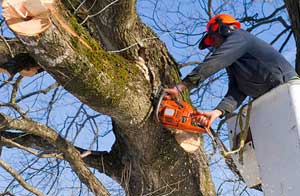
Considering that when trees are involved there can be both safety and conservation considerations, you have to call on a professional Liphook tree surgeon if any tree related work needs doing on your property. They must have suitable public liability coverage in case of accidents and ought to be affiliated with a relevant professional trade body such as the Arboricultural Association. It is also essential that they do legal checks to be certain that any of the stricken trees are not covered by Tree Preservation Orders. All responsible tree surgeons will help you to submit tree work applications to the local authority for Liphook, which may take up to 2 months.
Of course safety is the main concern when conducting any sort of tree work in Liphook, and your tree surgeon has to be acquainted with all of the correct safety procedures. He'll bring all the essential tools to work safely on your trees to make sure that they are not harmed in any way during the process, nor is any injury done to your home or yourself whilst the work progresses.
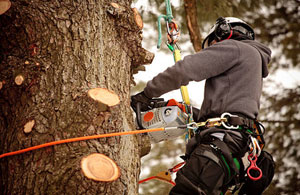
Using tree climbing and tree surgery apparatus comes as second nature to a seasoned tree surgeon, and he'll gladly get working using rigging ropes, lowering devices, wood chippers, climbing ropes, pole saws, harnesses, stump grinders, flip lines, rigging pulleys, loppers, winches and chain saws. This equipment can be fairly elaborate and has been produced over the years to make the tree surgery process both simpler and safer.
There are of course a lot of waste materials produced during the process of tree surgery and this should be taken away and responsibly got rid of. This ought to be included in the quotation, so ensure that this is the case. The ethical disposal of tree waste is a duty of care for all tree surgeons, so be wary of any individual that cannot verify that this in fact applies to them.
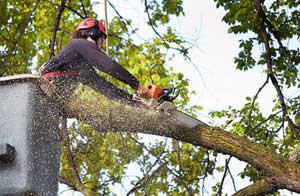
Tree surgeons don't solely do their thing in Liphook itself, but additionally throughout the nearby areas like Grayshott, Milland, Linchmere, Rake, Hammer, Shottermill, Bramshott, Longmoor, Passfield, Conford, Greatham and so forth. Hence, wherever in the Liphook area you reside, it is possible to get a reputable tree surgeon, and likewise all around Hampshire and neighbouring counties.
Tree surgeons don't merely clamber up, remove and trim trees using specialist equipment and tools, they are also tasked with their conservation and protection. Observing and understanding the safety aspects of trees, to pinpoint possible hazards is also an important part of their duties. They are responsible for ensuring that trees are disease-free, healthy and able to flourish and grow, providing enjoyment for all.
Tree surgery can be provided in Liphook and also nearby in: Greatham, Liss, Hammer, Grayshott, Passfield, Milland, Haslemere, Shottermill, Bordon, Bramshott, Conford, Linchmere, Whitehill, Rake, Headley Down, Hindhead, Longmoor, and in these postcodes GU30 7DU, GU30 7ED, GU30 7TT, GU30 7BE, GU30 7BG, GU30 7HN, GU30 7AE, GU30 7PT, GU30 7NJ, and GU30 7TZ. Local Liphook tree surgeons will probably have the telephone code 01428 and the postcode GU30.
For this type of service it is unquestionably far better to bring in a competent tree surgeon. Liphook business and home owners can benefit from the skills that a seasoned professional can offer.
Air-Spading Liphook
When the health of your trees is a concern, this might be due to any number of problems, but it is quite frequently because of issues with the root system. In order to check for soil compaction, root rot, or other potential issues, an experienced tree care specialist in Liphook may need to gain access to the roots of your tree.
Because of the likelihood of root damage during the digging down process, this was problematic in the past. The method that numerous modern day tree surgeons use is called "air spading", whereby compressed air is used to break up and clear away compressed soil without damaging tree roots or utilities.
The soil surrounding tree roots can become compacted by passing vehicles, foot traffic or building work, and this is known to have a negative impact on the general health of a tree. When a tree is "stressed" it can become more prone to attacks by insects, diseases and pests, and this stress can be caused by a lack of nutrients and water. Also useful for fixing root flare problems, air-spading can be used to effectively remove the excess soil from the base of a tree which has been covered, increasing the chance of root rot.
Involving the use of an air compressor and an air-spading tool, the air-spading process directs high-speed air into the soil, this breaks it up by penetrating spaces in the soil, but has no effect on the tree roots or nearby utilities. This fast flow of air blows the soil away from the roots, allowing immediate inspection and assessment. A much looser layer of wood chips and fertiliser can then be introduced to rejuvenate the tree, and a solution implemented for any obvious problems. (Tags: Air-Spade Liphook, Air-Spade Investigations Liphook, Air-Spading Liphook).
Protecting Trees in Winter
Protecting your trees and shrubs in winter is possibly a measure that you've not thought that much about, possibly presuming that the winters in the UK are not severe enough to justify this. Even the hardiest of shrubs, plants and trees can find it tough during the winter season, and a little bit of added protection in times of intense cold will definitely benefit them.
When you've got trees on your property in Liphook, it's high winds that are the biggest concern, and they may still be susceptible even though most of them will already have shed their leaves when winter arrives, thus being less resistant to wind. If a tree on your property has been weakened by wind, or is swaying and at risk of falling, a local tree surgeon must be brought in to perform an inspection. You can also have problems with trees due to heavy snowfall, so when weather like this is predicted, keep an eye open for possible damage. A good layer of mulch around the base of trees and shrubs (especially newly planted ones), will help to keep the roots frost-free and prevent them from becoming dehydrated.
Chainsaws in Tree Surgery
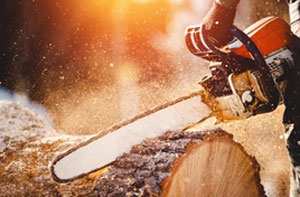
The most dangerous and probably the most common piece of equipment that is used by Liphook tree surgeons, is the chainsaw. Petrol driven chainsaws are the most popular with tree care professionals, due to their ease of use and greater portability, although mains versions are available, and battery operated chainsaws are becoming more popular in some situations. Where large tree trunks and thick limbs need cutting, such substantial tree work necessitates the use of the most powerful petrol chainsaws.
A chainsaw is composed of an engine and a rotating chain with a series of razor-sharp teeth which cut through the wood and bark of a tree. There are also different types of chainsaw, top-handled for working at height (and which can be used with one hand), rear-handled for work at ground level (two handed) and pole saws for long distance pruning and hard to reach branches.
Although carrying a rapidly rotating blade while balancing precariously high up in a tree is definitely not the safest job in the world, it's rare to see a tree surgeon in Liphook who doesn't use a chainsaw in his/her day-to-day work. All professional tree surgeons should be trained in the maintenance and safe use of chainsaws, and it is one of the primary conditions for becoming a registered member of the Arboricultural Association.
There are quite a few different makes of chainsaw, but the most commonly used by tree surgery specialists in the United Kingdom are Husqvarna, Stihl, Hyundai and Makita.
Dead-Wooding Liphook
The procedure of dead-wooding is a vital element of tree care in Liphook, and any decent tree surgeon will be able to offer this service to you. When there is a risk of dead and dying branches falling on vehicles, pedestrians or property, dead-wooding will be undertaken to carefully remove the offending limbs. Tree branches can die off for a variety of reasons, with disease, heavy shading, attack by pests or damage to the root system, recognised as the most widespread.
While the usual motive for getting rid of dead branches is that of safety, it's also often done to benefit the tree, or for aesthetic reasons. It's possible to greatly improve the health of a tree by eliminating dying, dead and damaged branches, an excessive number of which will attract the spread of disease and insect infestations. You can also make a tree look more attractive through this process, since a tree with a lot of dead wood can also look very unsightly.
As the smaller dead branches present very little risk, only substantial ones will be taken out in most situations. Although, where trees are hanging over a garden, a property, a public area, a park or a road in Liphook, it may be necessary to remove any dead wood that is over 50mm in diameter.
Tree Surgery Injuries
The work undertaken by tree care professionals in Liphook can be rather hazardous. Most tree work involves a high risk of injury to both operatives, co-workers and passers-by, therefore all possible safety measures must be taken when working on trees.
As reported by figures gathered by the Health and Safety Executive (HSE), falls from trees, the use of chainsaws, and being hit by a falling tree or branch are responsible for a large majority of fatal and serious injuries. In fact, tree surgeons and arborists are more at risk of serious injury than workers involved in the construction sector.
The most commonplace tree surgery accidents are being struck by objects (trees, cranes, branches, ropes, grapple hooks etc), lifting injuries and falling from ladders, with regards to insurance claims.
That's why choosing a qualified Liphook tree surgeon is so crucial when you've got tree care work that needs doing. In the tree care industry, most accidents are down to inexperienced workers trying to carry out tasks that they are not fully trained in, or equipped for. So, using a reputable and experienced Liphook company that has been working in the local area for a good few years, is the easiest way to sidestep such problems.
Leylandii Hedge Removal Liphook
Homeowners in Liphook frequently opt for Leylandii hedges because of their speedy growth and privacy advantages. Nevertheless, they have the potential to outgrow their bounds and become laborious to upkeep. If you intend to remove a Leylandii hedge, it's important to keep in mind a few key considerations. The primary consideration is to ascertain that the hedge isn't shielded by any legal provisions, including a Tree Preservation Order. When the hedge is under legal protection, you must seek the local council's approval before you can remove it. Also, Leylandii hedges can have intricate root structures, stressing the need to engage a qualified tree surgeon to safely remove the hedge and its roots. Once the hedge is removed, it's essential to dispose of the waste in a manner that is environmentally safe and responsible. In conclusion, removing a Leylandii hedge can be a risky and time-intensive process, making it crucial to take the necessary safety precautions and potentially hiring a professional if needed.
Firewood/Logs Liphook
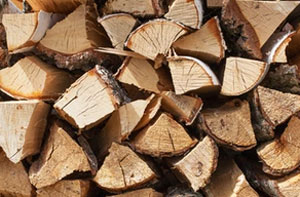
If you happen to be looking for firewood and logs in Liphook, tree surgeons are frequently a great source for this particular commodity. As felling trees and chopping off branches is a major part of their daily schedule, this is an obvious sideline for the enterprising tree surgeon.
Some Liphook tree surgeons will sell you seasoned and chopped logs which have been dried out and are ready to burn, while others might be willing to give you branches and logs free of charge, because they usually have loads of them to get rid of.
Bunging "wet" logs on your wood burner or open fire is not a good idea, and will produce lots of smoke and clog up your flue. You should only use logs which have been dried out for at least 12 months and have a moisture level of twenty percent or less. Tree surgeons in Liphook will typically have stocks of assorted hardwood logs and these are terrific for a sustained burn which will generate heat for many hours. If you can also pick up a few softwood logs, these are fantastic for getting a fire burning, and onto which you can chuck your seasoned hardwood logs once your fire is blazing.
Tree Surveys Liphook
There are a number of reasons why you could require a tree survey, and the most commonplace is for property extension or development. If, for example, you happen to be clearing some land in Liphook to make space for an extension to an existing property or a brand new house, and there are trees on that land, you will need to arrange a tree survey to British Standards BS5837 (2012). Liphook tree surveys on both private and public property, should be carried out by an accredited arborist or tree surgeon.
A whole bunch of information about all of the trees within a defined area will be produced by a properly conducted tree survey. For instance:
- The diameter of each tree (measured 1.5m above the ground).
- The ages of the trees.
- The height of each tree.
- The number of trees.
- The predicted life expectancy of the trees.
- The species of trees on the site (either common or scientific).
- Tree management advice.
- A tree reference number for each of the trees.
- The physiological and structural health of the trees.
- The spread of branches to the North, South, East and West.
- The existence of any TPOs.
If you are altering an existing property or home in Liphook but you're not extending the building's footprint and aren't modifying the access points or service lines, a tree survey probably won't be required.
Dutch Elm Disease
Destroying tree stocks and killing off tens of millons of precious elm trees all around Great Britain during the past fifty years or so, Dutch Elm Disease (Ophiostoma novo-ulmi) isn't so prevalent now, as it previously was. Caused by the fungus Ophiostoma novo-ulmi which is spread by the elm bark beetle (Scolytus), Dutch Elm Disease was introduced into the British Isles unintentionally in the 1960s from North America (Canada).
Its swift spread was attributed mainly to elm products such as saplings, mulching bark, elm crates, and firewood logs with the bark on, being transported throughout the United Kingdom. It was not just Britain that was affected by this awful disease, since the stocks of elm trees were also destroyed in continental Europe, North America and New Zealand.
Generally first materializing in early summer, the recognisable symptoms of DED disease are:
- New shoots that die back from the tips.
- Twigs turning into a "shepherd's crook".
- Clusters of leaves turning yellow and wilting.
- Dark spots or rings in the cross-section of twigs.
The felling of dying, dead and infected trees, has effectively removed the beetle's habitat, and in recent times the spread of this disease has been slowed. There is now a continuing project for propagating young saplings which are so far resistant to Dutch Elm Disease.
You could ask for a diagnosis from the THDAS (Tree Health Diagnostic and Advisory Service), or you can contact your local tree surgeon for advice and guidance, if you happen to have elm trees on your property in Liphook, and suspect that they might be affected by DED.
Trees of the families Ulmcae and Zelkova are affected.
Agent of spread - small beetles of the Scolytus genus.
Cause - fungi Ophiostoma Novo-Ulmi and Ophiostoma Ulmi.
(Tags: Spotting Dutch Elm Disease, Dutch Elm Disease Liphook, Symptoms of Dutch Elm Disease).Everyday Tasks for a Tree Surgeon
- Establish hazards posed by trees.
- Cut and chip branches and logs.
- Produce on-site or telephone quotes with the customers.
- Work with customers and complete admin tasks.
- Tree planting and transplanting.
- Prepare tree survey reports for domestic and commercial customers.
- Fell and remove trees and grind stumps.
- Climb trees to prune or remove branches.
- Maintain and service equipment like chippers and chainsaws.
- Clean up area upon completion and fulfil removal of waste product from customer's site.
- Be adept with power tools and powered machinery.
- Evaluate the health of trees and create plans of action.
Crown Thinning Liphook
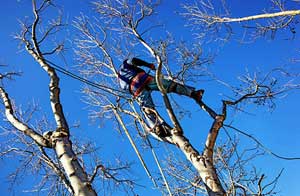
The removing of some of the small branches towards the outer crown of a tree to deliver a density of foliage that's uniform all over and does not change the size or shape of a tree, is referred to as crown thinning. This work is mostly only carried out on broad leafed trees (rather than conifers) and is done to stop the tree uprooting when it is windy, to lower the weight of the crown of the tree, to help reduce the wind resistance of the tree, to alleviate the stress upon particular branches because of snow, gravity, ice, or wind or to let more light throughout. The general size and form of the tree shouldn't be changed by crown thinning, and should only produce a uniform foliage thickness surrounding uniformly spaced branches. It should be possible to get crown thinning services in Grayshott, Milland, Linchmere, Rake, Hammer, Shottermill, Bramshott, Longmoor, Passfield, Conford, Greatham, and the Liphook area.
Wood Chipping Liphook
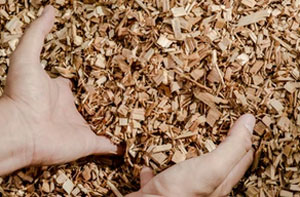
In order to process the large quantities of vegetation, branches and tree limbs that are the result of their work, the majority of Liphook tree surgeons will use wood chipping machinery. Depending on the equipment that is being used, these impressive wood chipping machines can gobble up as much as forty tons of material every hour, although around 5 tonnes per hour can be processed by the more frequently used devices.
Chopped down tree branches are obviously a good deal easier to transport, taking up a lot less space in the tree surgeon's truck, and can in addition be used for weed prevention, mulching gardens, landscaping, garden pathways, cultivating mushrooms, wood pulp, ecosystem restoration and biomass fuel, to name but a few.
If you've a use for the wood chips that have been produced during your tree surgery assignment, tree surgeons in Liphook will normally be happy to let you have whatever you want, and they'll take away the rest to use in other locations, or dispose of in the appropriate way. Tree surgeons are the best source for wood chippings which you can use for various purposes in your garden, even if you do not require any tree surgery doing on your property in Liphook. Some tree surgeons will want paying for wood chips, particularly if you need to have them delivered, others will let you have them at no cost.
Wood chipping equipment is manufactured by several companies, some of the most popular brands include Hyundai, Timberwolf, Forst and Forest Master. (Tags: Wood Chipping Liphook, Wood Chipping Services Liphook, Wood Chipping Machines Liphook, Wood Chips Liphook).
Tree Removal Liphook
Removing a tree is sometimes unavoidable, especially when it becomes unsafe, diseased, or simply too large for its current location. While trees play a vital role in our environment, there are occasions when they pose a risk to nearby properties or people. Overhanging branches, invasive roots, or the danger of a falling tree can mean that removal is the safest choice. It's never a decision to take lightly, but when necessary, it can enhance the safety and usability of your outdoor space in Liphook, providing valuable peace of mind.
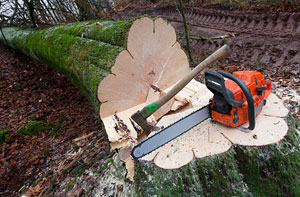
You might be surprised to hear that tree removal isn't as easy as it looks, particularly when it comes to larger trees. It takes some serious planning and the right tools to get it done properly and safely. That's where tree surgeons come in - professionals who understand how to assess a tree and figure out the best way to remove it with minimal effect on the nearby area. They also handle the tree's disposal, which saves you the trouble. So if you're thinking of doing it on your own, just remember that it can be a bit risky. It's usually better to leave such complex jobs to an expert.
When a tree is taken down, it really makes way for fresh opportunities in your outdoor space. More sunlight can reach nearby plants, and that newly available space could be put to great use - perhaps you might want to create a patio, a driveway, or even a lovely garden feature. Whether you're looking to enhance safety or just want to improve your garden's layout, removing a tree with care can truly transform your Liphook garden or outdoor area, making it a more enjoyable space for many years ahead. (Tags: Tree Removal Liphook).
Pollarding Trees Liphook
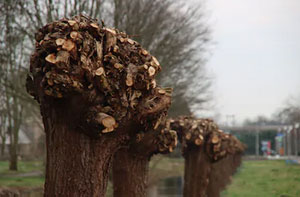
Pollarding is most notably carried out on grounds of safety, and is a technique that's used for drastically reducing a tree's overall size when it's got too big for its location. The development of cultivated attributes and the moulding of trees into certain forms can also be accomplished by the pollarding approach. You will regularly observe trees which have been pollarded beside highways in Liphook, and also pretty frequently in managed hedgerows The rather harsh and bare appearance that is the consequence of pollarding is not at all popular with tree lovers, seeing that it's so dissimilar to its attractive natural state. The beneficial aspect of the pollarding process, is that trees that may otherwise need to be cut down can be saved in-situ. Pollarding is typically done on broad-leafed species like limes, beeches, maples, sycamores, oaks, planes and horse chestnuts.
Tree Transplanting Liphook
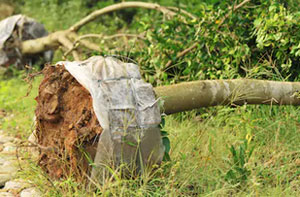
Moving mature trees is an intricate, yet rather straightforward process nowadays, due mostly to cutting-edge truck mounted spades, tree lifting equipment and other specialist tools. A competent tree moving service in Liphook will be glad to move any trees you have on your property, or transplant fully developed trees for an instant aesthetic appeal.
Moving a tree in Liphook is less stressful on the root system and health of the tree in autumn and winter seasons, but it can still be achieved in warmer summer season by comprehensively soaking the ground before lifting. To lift a tree from the soil a tractor mounted mechanical spade is pushed down into the ground to encircle the tree's root ball, before hauling the entire tree free. The uplifted tree can then be temporarily stored before its transplanting in its new home.
If you intend to move a tree from land that's got a preservation order upon it, a specialist tree moving contractor in Liphook can liaise with relevant authorities to approve replanting in an agreed location.
Tree Surgery Tasks Liphook

Liphook tree surgeons can normally help with shielding trees from grazing, stump treatment, crown lifting, commercial tree surgery, tree pruning, crown reduction, airspading, tree watering in Liphook, stump removal in Liphook, eco plug treatments, tree fertilising, brush cutting, tree cutting, tree surveys, fruit tree pruning, hazard assessments, tree waste removal, coppicing, tree transplanting, crown thinning, soil terravention, tree replanting, repair of storm damaged trees, tree lightening protection, dead wooding, tree lopping, cut sealing, formative pruning, domestic tree care, tree staking, root decompaction, emergency tree surgery, tree shaping, shrub maintenance Liphook, woodland management and other tree surgeon services in Liphook, Hampshire. Listed are just a handful of the activities that are handled by local tree surgeons. Liphook specialists will be happy to tell you about their whole range of services.
Tree Surgeons Near Liphook
Also find: Whitehill tree surgeons, Bordon tree surgeons, Bramshott tree surgeons, Rake tree surgeons, Milland tree surgeons, Grayshott tree surgeons, Haslemere tree surgeons, Headley Down tree surgeons, Longmoor tree surgeons, Hammer tree surgeons, Greatham tree surgeons, Conford tree surgeons, Liss tree surgeons, Linchmere tree surgeons, Passfield tree surgeons, Shottermill tree surgeons, Hindhead tree surgeons and more. All these towns and villages are served by professional tree surgeons. Local residents and others can get tree surgery quotes by going here.
Tree Care Services Liphook
- Woodchipping
- Tree Management
- Wood Chipping
- Stump Removal
- Tree Dismantling
- Tree Maintenance
- Tree Lopping
- Crown Thinning
- Crown Raising
- Tree Felling
- Tree Shaping
- Tree Topping
- Tree Transplanting
- Stump Treatment
More Liphook Trades: Not surprisingly, whenever you are having tree surgery done in Liphook, Hampshire, you will likely need other garden related services, and together with a tree surgeon in Liphook, Hampshire, you might additionally need grass cutting in Liphook, garden rubbish removal in Liphook, block paving in Liphook, patio cleaning in Liphook, decking specialists in Liphook, artificial grass installers in Liphook, fencers in Liphook, hedge shaping in Liphook, garden pond builders in Liphook, local SKIP HIRE in Liphook, garden design in Liphook, garden digging services in Liphook, landscaping in Liphook, garden shed installation in Liphook, garden clearances in Liphook, garden wall construction in Liphook, and other different Liphook tradespeople.
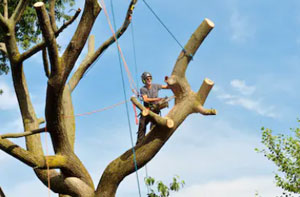 Tree Surgeon Liphook
Tree Surgeon Liphook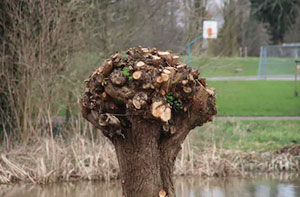 Tree Care Liphook
Tree Care Liphook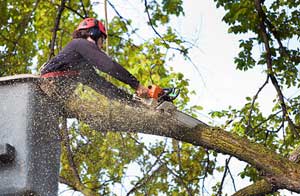 Tree Surgery Liphook
Tree Surgery LiphookMore: Soil Terravention, Stump Removal, Stump Treatment, Crown Removal, Cable Bracing, Site Clearance, Tree Maintenance, Tree Surveys, Tree Surveys, Tree Watering, Tree Pruning, Hedge Reduction, Air-Spading, Crown Cleaning, Tree Lopping, Hedge Trimming, Hedge Cutting, Soil Terravention, Woodland Management, Crown Thinning, Stump Grinding, Tree Removal, Tree Maintenance, Tree Care, Woodland Clearance, Site Clearance, Tree Reduction, Soil Terraventing, Soil Terravention, Tree Dismantling.
To find out local Liphook information go here
Tree Surgeon Jobs Liphook: Find Liphook tree surgeon jobs here: Tree Surgeon Jobs Liphook
Tree Surgery GU30 area, (dialling code 01428).
Tree Pruning Liphook - Tree Surgeons Near Me - Forest Management Liphook - Tree Management Liphook - Crown Lifting Liphook - Tree Surgery Liphook - Stump Removal Liphook - Tree Surgeons Liphook - Arboriculture Liphook




